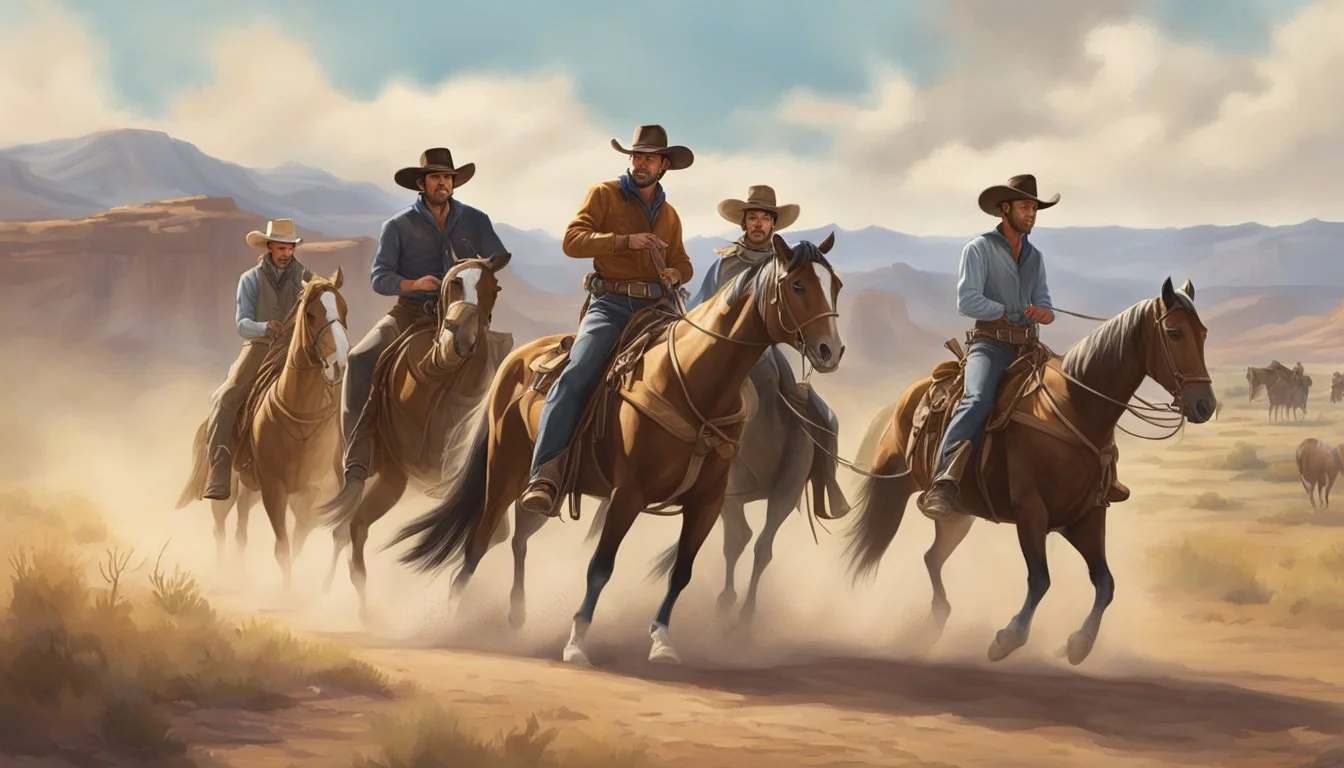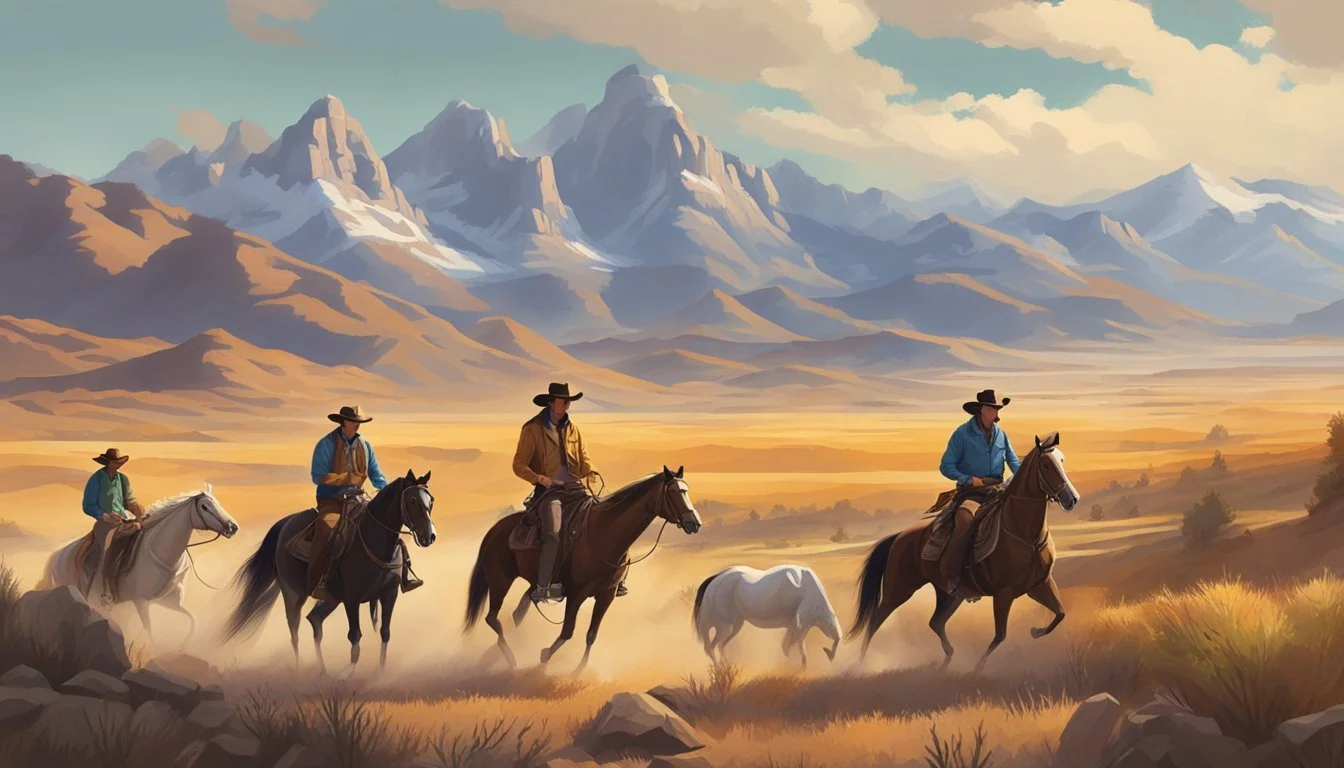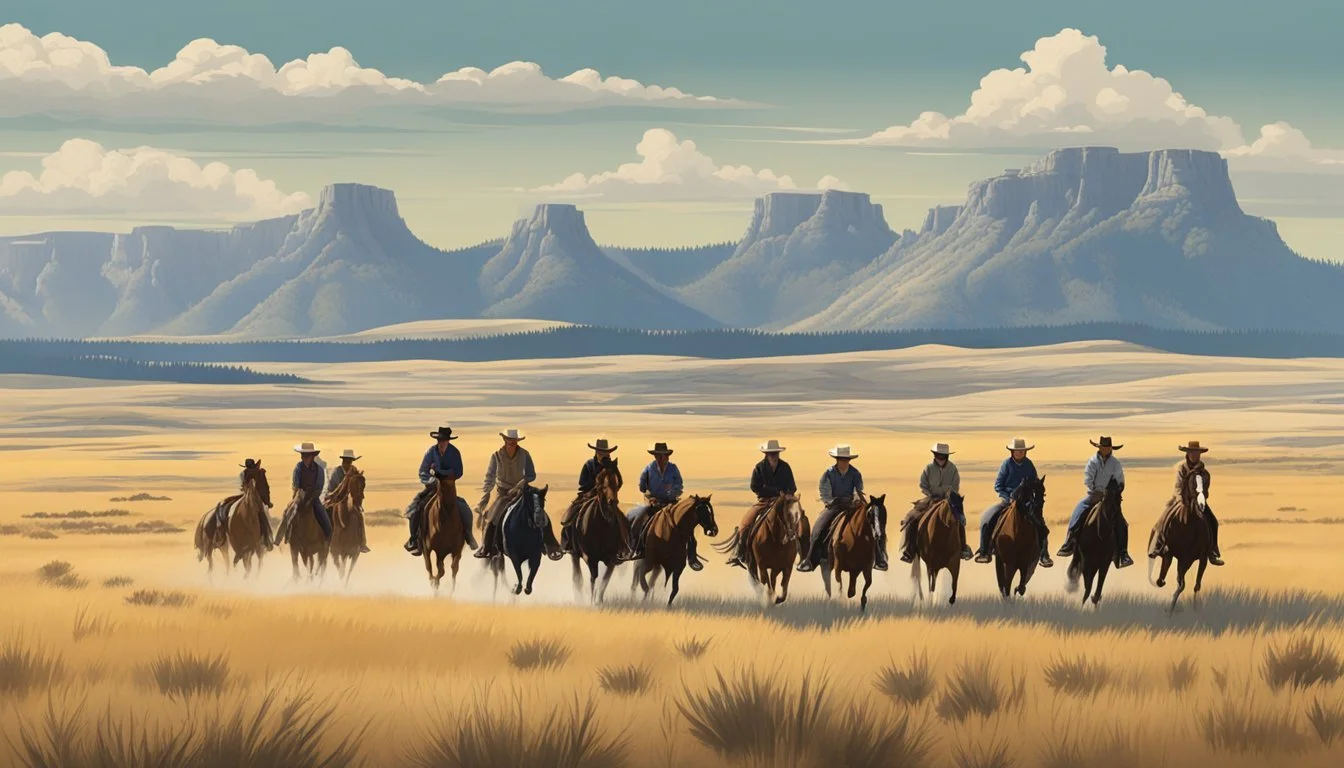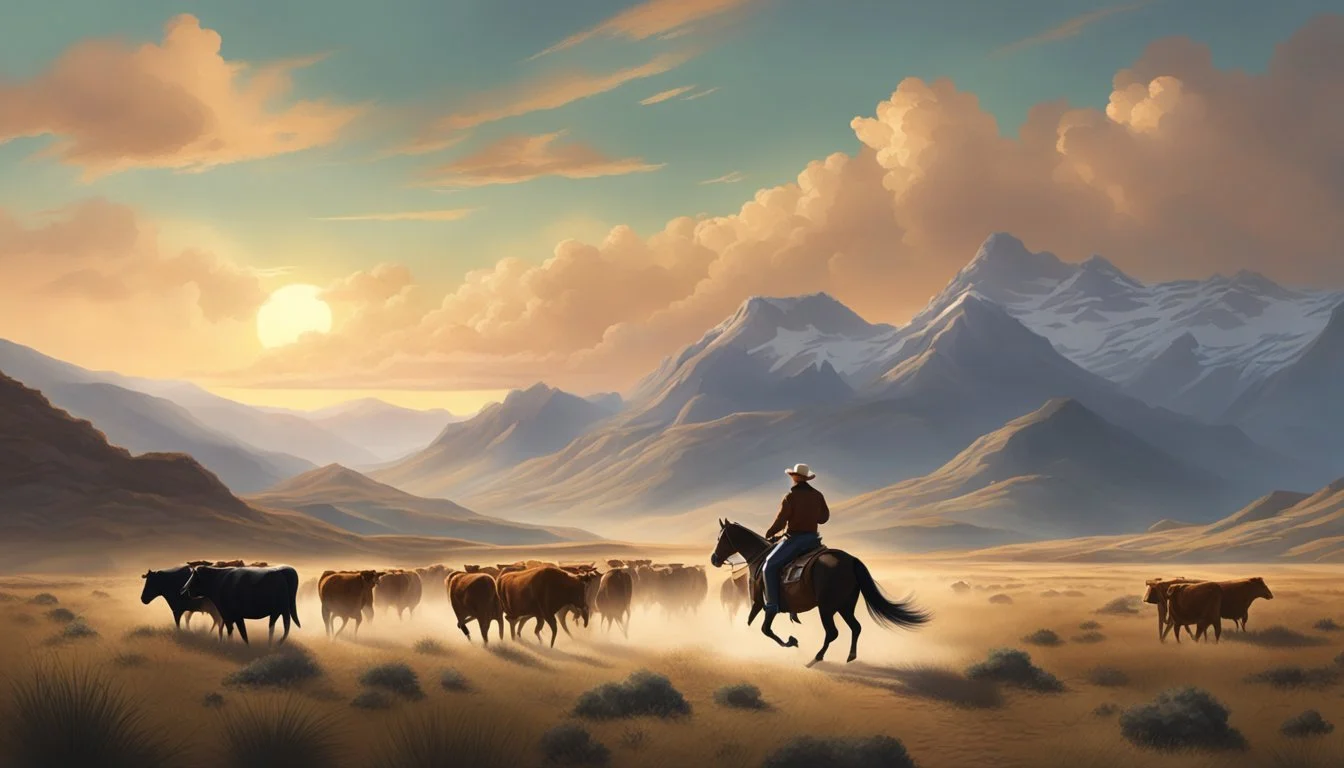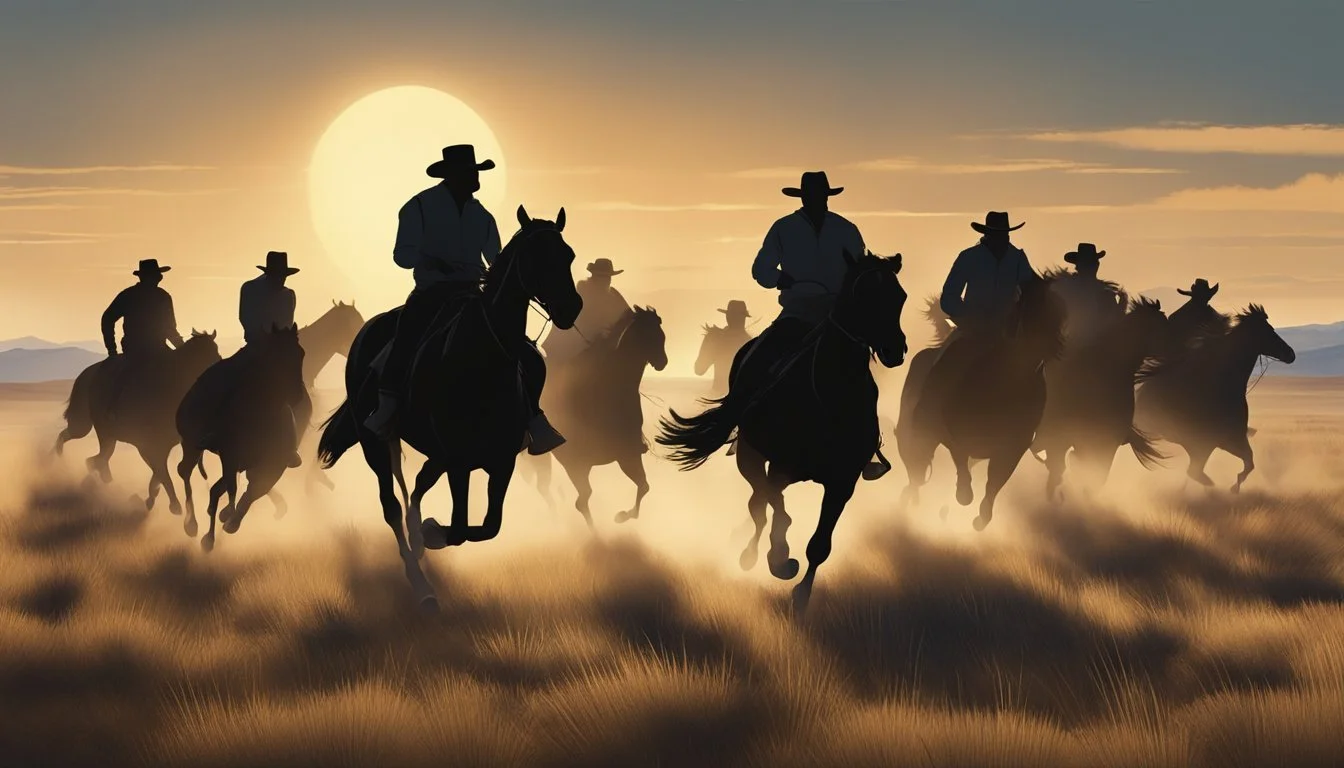Are the Yellowstone Actors Real Cowboys? The Shocking Truth Revealed!
Yellowstone, the hit neo-western drama series, has captivated audiences with its gritty portrayal of ranching life in Montana. The show's creators have gone to great lengths to ensure authenticity, leaving many viewers wondering about the real-life cowboy credentials of its cast. While not all Yellowstone actors are professional cowboys, several cast members have genuine experience in ranching and rodeo.
Taylor Sheridan, the show's creator, has played a crucial role in bringing authenticity to Yellowstone. With an extensive background in ranching, Sheridan personally taught the actors how to ride and even sent them to a "cowboy camp" to hone their skills. This dedication to realism has paid off, as the show's depiction of ranch life feels genuine and immersive.
Some standout examples of real-life cowboys in the Yellowstone cast include Forrie J. Smith, who plays Lloyd. Smith's character draws from his own experiences as a rodeo cowboy and stuntman. The show also features other actors with ranching backgrounds, adding layers of authenticity to their performances and contributing to Yellowstone's overall appeal.
Backdrop of 'Yellowstone': The Setting and Origins
Yellowstone' captivates viewers with its stunning Montana landscapes and authentic portrayal of modern ranch life. The show's setting and origins are deeply rooted in the American West, blending traditional cowboy culture with contemporary conflicts.
Montana Ranch as the Series Locale
The Chief Joseph Ranch in Darby, Montana serves as the primary filming location for 'Yellowstone'. This 2,500-acre working cattle ranch provides the authentic backdrop for the fictional Dutton family ranch. The property's main lodge, barns, and corrals feature prominently in the series, lending genuine Western atmosphere to the show's scenes.
Montana's breathtaking scenery plays a crucial role in the series. Vast prairies, towering mountains, and pristine rivers emphasize the characters' deep connection to the land. The state's natural beauty serves as more than just scenery; it becomes a character in its own right, influencing the story and the Duttons' fierce determination to protect their legacy.
Neo-Western Genre and Cultural Impact
'Yellowstone' falls within the neo-Western genre, updating traditional Western themes for a modern audience. The show explores contemporary issues facing the American West, such as land disputes, tribal relations, and the clash between tradition and progress.
The series has sparked renewed interest in cowboy culture and ranch life. It portrays the challenges of maintaining a traditional way of life in a rapidly changing world. This cultural impact extends beyond entertainment, influencing fashion trends and inspiring viewers to explore Montana's rugged landscapes.
Influence of Taylor Sheridan's Work
Taylor Sheridan, the creator of 'Yellowstone', brings his extensive background in ranching to the series. His personal experiences and understanding of the cowboy lifestyle lend authenticity to the show's portrayal of ranch life.
Sheridan's commitment to realism extends to the cast's preparation. He personally taught the actors how to ride horses and sent them to "cowboy camp" to learn essential ranching skills. This dedication to authenticity helps the actors embody their characters more convincingly on screen.
Sheridan's work on 'Yellowstone' continues his exploration of the modern American West, a theme present in his earlier films like 'Hell or High Water' and 'Wind River'. His unique perspective shapes the series' narrative, blending drama with genuine insights into contemporary ranching challenges.
The Cast of 'Yellowstone': Actors versus Characters
The cast of 'Yellowstone' brings a unique blend of acting talent and real-life cowboy experience to their roles. Some actors have extensive backgrounds in ranching, while others learned the skills for the show.
Kevin Costner's Role as John Dutton
Kevin Costner portrays John Dutton, the patriarch of the Dutton family. While Costner isn't a real-life cowboy, he has significant experience in Western films. His roles in 'Dances with Wolves' and 'Open Range' prepared him for the part of John Dutton.
Costner's dedication to authenticity shines through in his performance. He worked closely with creator Taylor Sheridan to understand the nuances of ranch life and cowboy culture.
The Ensemble of the Dutton Family and Employees
The supporting cast brings a mix of acting prowess and genuine cowboy credentials to their roles. Kelly Reilly (Beth Dutton) and Wes Bentley (Jamie Dutton) learned horseback riding for the show.
Cole Hauser, who plays Rip Wheeler, grew up around horses and quickly adapted to the cowboy lifestyle. Jefferson White (Jimmy Hurdstrom) underwent intensive cowboy training for his role.
Forrie J. Smith, who portrays Lloyd Pierce, stands out as a real-life cowboy. His rodeo background lends authenticity to his performance. The blend of experienced actors and genuine cowboys creates a convincing portrayal of life on the Yellowstone ranch.
Depicting Cowboy Culture on Screen
Yellowstone brings authentic cowboy culture to television through meticulous attention to detail and real-world expertise. The show's creators strive for accuracy in portraying ranch life, rodeo events, and daily cowboy activities.
Authenticity of Cowboy Lifestyle Representation
Yellowstone achieves authenticity by employing real cowboys to train actors and advise on set. This ensures accurate depictions of horsemanship, cattle handling, and ranch work. The show's creators draw from personal ranching experience to craft realistic storylines and characters.
Costumes and props are carefully selected to reflect genuine cowboy attire and tools. From well-worn boots to weathered hats, every detail contributes to an immersive portrayal of ranch life.
The series also explores the values and traditions of cowboy culture, showcasing the tight-knit community and strong work ethic associated with this lifestyle.
Rodeo Themes and Cowboy Activities
Rodeo events feature prominently in Yellowstone, highlighting an essential aspect of cowboy culture. The show depicts various rodeo competitions, including:
Bull riding
Barrel racing
Calf roping
Bronc riding
These scenes are choreographed with input from professional rodeo athletes to ensure accuracy and excitement. The show also explores the camaraderie and rivalry among rodeo participants, offering insights into this unique subculture.
Incorporating Real Ranch Work into Storylines
Yellowstone integrates authentic ranch work into its narratives, showcasing the daily challenges and triumphs of cowboy life. Viewers witness characters:
Branding cattle
Mending fences
Conducting cattle drives
Breaking horses
These activities are not mere background elements but often drive plot points and character development. By incorporating real ranch work, the show educates viewers about the complexities of modern ranching while maintaining dramatic tension.
The series also addresses contemporary issues facing ranchers, such as land disputes and environmental concerns, grounding the cowboy lifestyle in present-day realities.
Real-Life Cowboys within the Cast
Several Yellowstone actors bring authentic cowboy experience to their roles. Their backgrounds in ranching, rodeo, and horseback riding add depth and realism to the show's portrayal of ranch life.
Forrie J. Smith as Lloyd and Rodeo Background
Forrie J. Smith, who plays Lloyd on Yellowstone, is a genuine cowboy. He grew up on a ranch in Montana and started riding horses at age 6. Smith competed in rodeos for over 25 years, participating in events like team roping and steer wrestling. His extensive rodeo experience makes him uniquely qualified to portray Lloyd, the seasoned ranch hand. Smith's authentic cowboy mannerisms and knowledge of ranch operations shine through in his performance.
Ryan Bingham's Authenticity as Walker
Ryan Bingham, who portrays Walker, has deep roots in cowboy culture. He spent his early years living on ranches in New Mexico and Texas. Bingham learned to ride horses at a young age and competed in bull riding events as a teenager. His real-life experiences inform his portrayal of Walker, bringing a genuine cowboy demeanor to the character. Bingham's musical talents, showcased on the show, also stem from his authentic cowboy background.
Other Cast Members with Cowboy Roots
Several other Yellowstone cast members have real-life cowboy experience:
Jake Ream (Jimmy): Worked as a horse trainer before joining the show
Ethan Lee (Ethan): Grew up on a ranch and competed in rodeos
Taylor Sheridan (creator): Has a ranching background and taught cast members to ride
These actors' genuine cowboy skills contribute to the show's authenticity. Their familiarity with horses, ranch work, and Western lifestyle adds credibility to their performances and enhances the overall realism of Yellowstone.
Training and Preparation for the Roles
The cast of Yellowstone undergoes rigorous training to authentically portray cowboys and ranch hands. This preparation includes intensive boot camps, horseback riding lessons, and hands-on ranching experience.
Cowboy Camp for Cast Members
Taylor Sheridan, Yellowstone's creator, insists on authenticity from his actors. He runs a "cowboy boot camp" at his ranch near Dallas, Texas. Cast members attend this camp to learn essential cowboy skills before filming begins. The boot camp covers various aspects of ranch life, including horse care, roping techniques, and cattle handling. Actors practice these skills extensively to ensure they look natural on screen.
Participants learn to move and behave like real cowboys, adopting the mannerisms and attitudes typical of ranch workers. This immersive experience helps actors understand the cowboy lifestyle and mindset, crucial for convincing portrayals.
Horse Riding and Stunt Training
Horseback riding is a fundamental skill for Yellowstone actors. Many cast members arrive with little to no riding experience. They receive intensive training from experienced wranglers and stunt coordinators. Actors learn proper mounting, dismounting, and riding techniques.
Safety is paramount during this training. Stunt professionals teach actors how to fall safely from horses and perform basic stunts. As their skills improve, some cast members progress to more advanced riding techniques, such as galloping and jumping.
Trick riding lessons are also provided for scenes requiring spectacular horseback feats. These skills add excitement and authenticity to action sequences.
Learning the Ropes of Ranching
Cast members gain hands-on experience with real ranching tasks. They learn to rope cattle, a crucial skill for cowboys managing livestock. Proper lasso techniques are taught, including forming and throwing loops accurately.
Actors practice branding, herding, and other daily ranch activities. They work with experienced ranch hands to understand the physical demands and technical aspects of these tasks. This practical knowledge helps actors portray their characters convincingly during filming.
The training also covers the use of various ranching tools and equipment. Actors learn to handle ropes, saddles, and other gear proficiently. This attention to detail ensures that even background scenes in Yellowstone appear authentic and true to life.
The Legacy of Ranches: Fictional and Real
Ranches play a central role in both the fictional world of Yellowstone and the real American West. They serve as powerful symbols of tradition, family, and the cowboy way of life.
Dutton Yellowstone Ranch: Fictional Icon
The Yellowstone Dutton Ranch stands as the heart of the hit TV series. This vast fictional property showcases the challenges of maintaining a working cattle ranch in modern Montana. The Duttons' struggle to protect their land from developers and rival interests mirrors real-world conflicts faced by ranchers today.
At over 500,000 acres, the Yellowstone Ranch dwarfs most real properties. Its sprawling landscape serves as a character itself, shaping the lives and decisions of the Dutton family. The ranch's iconic "Y" brand symbolizes loyalty and belonging for those who bear it.
Historic Ranches and the 6666 Legacy
The 6666 Ranch, also known as the Four Sixes, is a real Texas institution featured in Yellowstone's spinoff series. Founded in 1870, it spans over 260,000 acres across multiple counties. The 6666 Ranch has a storied history in cattle ranching and horse breeding.
Unlike the fictional Yellowstone, the 6666 Ranch continues operations today. Its legacy includes developing the Quarter Horse breed and hosting prestigious rodeo events. The ranch's inclusion in the Yellowstone universe highlights the enduring cultural significance of these historic properties.
Real Ranches as Filming Locations
Yellowstone utilizes authentic ranch settings to create its immersive world. The Chief Joseph Ranch in Darby, Montana, serves as the primary filming location for the Dutton homestead. This 150-acre working cattle ranch adds genuine Western atmosphere to the show.
Other Montana ranches feature prominently in exterior shots, showcasing the state's breathtaking landscapes. The Bosque Ranch in New Mexico provides additional filming locations, expanding the show's visual range beyond Montana.
These real properties lend authenticity to Yellowstone's portrayal of ranch life. Their rugged beauty and functional operations allow actors to interact with genuine Western environments, enhancing the show's realism.
Examining the Realism of 'Yellowstone'
'Yellowstone' strives for authenticity in its portrayal of modern ranching and the American West. The show blends realistic elements with dramatized storylines to create a compelling narrative.
Representation of Contemporary Ranching Issues
'Yellowstone' tackles real-world challenges faced by ranchers today. Land disputes, water rights, and encroaching development are central themes. The show depicts the struggle to maintain traditional ways of life in a changing landscape.
The series showcases authentic ranching techniques and cowboy skills. Scenes of cattle branding, horse training, and fence mending reflect genuine ranch operations. This attention to detail adds credibility to the portrayal of ranch life.
'Yellowstone' also explores the economic pressures on modern ranches. The Dutton family's efforts to keep their land viable mirror actual concerns of many ranchers.
Portrayal of the Modern West
'Yellowstone' presents a nuanced view of the contemporary Western United States. It captures the tension between preserving tradition and embracing progress.
The show depicts the clash between rural and urban interests. Conflicts with developers, tourists, and government agencies reflect real dynamics in many Western communities.
'Yellowstone' also addresses Native American issues, showcasing the complex relationships between tribes and neighboring ranchers. This adds depth to the portrayal of the modern West.
The series balances romantic notions of cowboy culture with gritty realism. While it celebrates the cowboy lifestyle, it doesn't shy away from showing its hardships and moral complexities.
Cultural and Cinematic Influences in 'Yellowstone'
'Yellowstone' draws inspiration from classic Western films while incorporating modern elements. The show's portrayal of cowboys and ranch life has impacted media depictions of the American West.
Impact on Media and Public Perception
'Yellowstone' has revitalized interest in cowboy culture and the modern American West. The show's authentic portrayal of ranch life, aided by real cowboys on set, has educated viewers about contemporary ranching practices.
This authenticity has sparked renewed fascination with cowboy lifestyles among audiences. Many fans have sought out ranch experiences or taken up horseback riding as a result.
The series has also influenced fashion trends, with Western-inspired clothing and accessories gaining popularity. Cowboy hats, boots, and denim have seen increased sales since the show's debut.
Comparisons with Traditional Westerns
'Yellowstone' blends elements of classic Westerns with contemporary themes. Like its predecessors, the show features rugged landscapes, horseback riding, and conflicts over land and resources.
However, 'Yellowstone' updates these tropes for modern audiences. It addresses current issues such as land development, Native American rights, and corporate interests in the West.
The series also portrays complex family dynamics and political maneuvering, adding depth to the traditional Western formula. This approach has attracted viewers who might not typically engage with the genre.
'Yellowstone' maintains the spirit of classic Westerns while adapting to current storytelling styles and production values. This balance has contributed to its widespread appeal and critical acclaim.
Conclusion: Merging Myth and Reality in 'Yellowstone'
'Yellowstone' blends elements of cowboy mythology with authentic ranch life. The show's creator, Taylor Sheridan, draws from his ranching background to infuse realism into the series.
While not all actors are real cowboys, many underwent intensive training to portray their roles convincingly. This commitment to authenticity shines through in the characters' riding skills and ranch work depictions.
The series captures the harsh realities of modern ranching, including environmental challenges and conflicts with land developers. These elements resonate with real cowboys and ranchers who face similar issues.
'Yellowstone' also incorporates historical accuracy in its costume design and set details. The show's attention to proper hat styles and chap-wearing techniques adds credibility to its portrayal of cowboy culture.
Kevin Costner's lead role lends star power to the series, bridging the gap between Hollywood glamour and rugged Western imagery. This combination helps 'Yellowstone' appeal to a broad audience while maintaining its ties to the American West.
By merging mythic cowboy ideals with contemporary ranch life, 'Yellowstone' creates a compelling narrative that both entertains and educates viewers about the realities of the modern American West.

